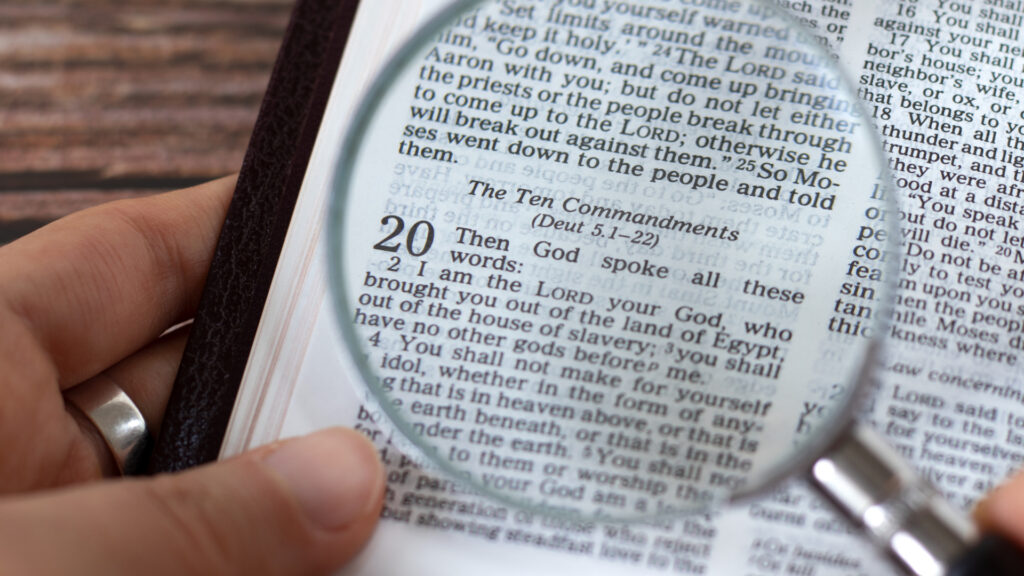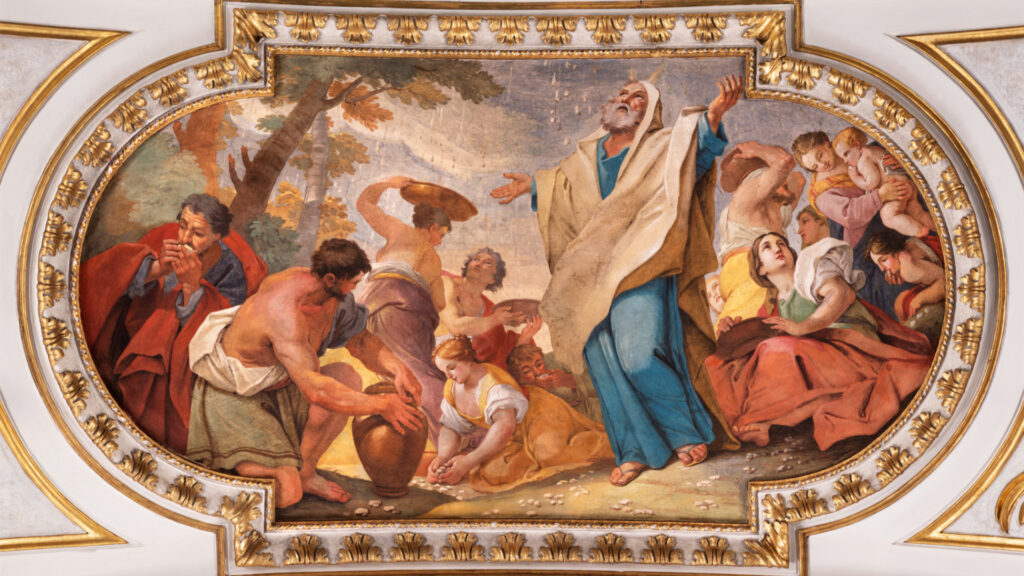Exodus
Transformative Joy
Read This Week: Exodus 24
When Moses went and told the people all the Lord’s words and laws, they responded with one voice, “Everything the Lord has said we will do.” Moses then wrote down everything the Lord had said. He got up early the next morning and built an altar at the foot of the mountain and set up twelve stone pillars representing the twelve tribes of Israel. – Exodus 24:3-4 NIV
Chapter 24 is pivotal in Exodus, where God’s covenant with Israel is formally confirmed. This moment marks a transition from giving the law to establishing a sacred relationship between God and His chosen people. The chapter is rich with spiritual insights and practical applications, offering lessons on covenantal faithfulness, worship, and the holiness of God. The chapter begins with an invitation from God to Moses, Aaron, Nadab, Abihu, and seventy elders of Israel to ascend Mount Sinai. Here, God reveals His presence. The layout of this chapter reflects a covenant ceremony, which shows the transformative joy of Israel’s commitment.
This section demonstrates that God calls specific leaders to approach Him but with clear boundaries. While Moses alone can come near, others must worship from afar. This emphasizes God’s holiness and the necessity of reverence in coming before Him. Verses 3-8 show that Moses shares God’s laws with the people, and they respond, “All the words which the Lord has said we will do.” Moses offers sacrifices and sprinkles the blood on the altar and the people, symbolizing the binding nature of this covenant. Blood signifies purification and commitment, foreshadowing to the ultimate covenant in Christ’s blood.
Verses 9-11 tell us that The leaders see a manifestation of God, described as a pavement of sapphire beneath His feet—a scene of transcendent beauty and holiness. Remarkably, they eat and drink in His presence, signifying peace and fellowship. Then in verses 12-18, God calls Moses higher to receive the stone tablets. As Moses enters the cloud of glory, the text emphasizes his obedience and the awe-inspiring presence of God, represented by the consuming fire on the mountain.
The people’s declaration, “We will do and be obedient,” highlights the importance of commitment in a covenant relationship. For believers today, it serves as a reminder that faith must be accompanied by a willingness to follow God’s commands. The structured approach to God’s presence—allowing some to draw closer while others remain at a distance—teaches reverence. It also points to Christ as our mediator, through whom we have full access to God.
The sprinkling of blood prefigures Jesus’ ultimate sacrifice, which sealed the new covenant (Hebrews 9:12–15). This invites us to reflect on the depth of God’s grace and the cost of our redemption. The sapphire-like pavement and the consuming fire illustrate God’s otherness and majesty. This should inspire awe in our worship and remind us that our God is transcendent and approachable through Christ. Moses’ ascent to the cloud represents an invitation to deeper communion with God. In our spiritual journey, we are also called to seek God’s presence and linger in His word and prayer for deeper understanding and intimacy.
Just as the Israelites affirmed their obedience, we should take time to reaffirm our commitment to God. Reflect on areas of our lives where we must align more closely with His will. Consider how we prepare for worship. Do we come with a sense of awe, or has it become routine? It should compel us to reflect on God’s holiness as we gather in His presence. The blood of the covenant points to Christ, and we should let the significance of His sacrifice motivate us to live a life of gratitude and surrender.
Moses’ encounter with God also shows the value of solitude with Him. Dedicate time each day to seek His presence through Scripture and prayer, allowing His glory to transform you. The shared meal in God’s presence reminds us of the importance of community. Engage in Christian fellowship where mutual encouragement and shared worship are central.
This section of our study is a profound narrative of God’s desire to dwell with His people, establish relationships, and invite them into His glory. As we study and meditate on Exodus 24, may we be inspired to live in covenantal faithfulness, worship God with honor, and seek His presence daily. In doing so, we experience the joy and transformation of fellowship with the Almighty.
Walk Faithfully
Read This Week: Exodus 23
Do not spread false reports. Do not help a guilty person by being a malicious witness. “Do not follow the crowd in doing wrong. When you give testimony in a lawsuit, do not pervert justice by siding with the crowd, and do not show favoritism to a poor person in a lawsuit. – Exodus 23:1-3 NIV
Exodus 23 begins by addressing truth-telling and justice. The text warns against spreading false rumors, following the crowd in doing wrong things, and showing favoritism in disputes, whether to the rich or the poor. It delves into the issues of impartiality and honesty as the bedrock of justice and a way to live as a society.
In a world where national and social media propagates and amplifies misinformation and peer pressure often sway decisions, this passage reminds us to seek truth and act with integrity no matter the outside influence. Justice is not about popularity or convenience but about fairness and accountability. Before sharing news or opinions, the principles of the OT law and the teachings of Jesus and Paul call us to pause and verify their accuracy. We should commit to advocating for fairness, even when it’s unpopular or difficult.
Verses 4-5 provide an unexpected directive: if you encounter your enemy’s ox or donkey wandering, you must return it. If the animal is struggling under a heavy load, you must help, regardless of personal grievances. This teaching rises above mere legality; it calls for compassion that transcends enmity. It challenges our instinct for revenge or indifference toward those we dislike. By fostering goodwill even toward enemies, we build bridges rather than barriers. Next time we’re faced with an opportunity to help someone we dislike or disagree with, act on it. Unexpected kindness can heal relationships and transform hearts.
Verses 10-12 reiterates the importance of the Sabbath, extending rest not just to people but also to animals and the land. Every seventh year, the land was to lie fallow so the poor could glean its produce, and the Sabbath day ensured rest for all, including servants and foreigners. These practices reveal God’s care for creation and commitment to equitable provision. They remind us that rest is not a luxury but a necessity—for people, communities, and the environment. In our fast-paced, productivity-driven culture, embrace rhythms of rest. Take intentional breaks to rejuvenate your body, soul, and relationships.
Verses 13-19 take us to laws concerning worship that emphasize devotion to God, keeping the festivals, and offering the best of what we have. Worship was an act of reverence, gratitude, and commitment to the Lord. This section challenges us to prioritize God and give Him our best—not just in material offerings but in our time, energy, and focus. These passages challenge us today and ask us to consider how we structure our time and resources. Are we offering God the first fruits of our lives, or merely what’s left over after everything else?
Verses 20-33 bring the chapter to its conclusion with a promise: God would send an angel to guide and protect the Israelites on their journey. Their success, however, depended on obedience and faithfulness. They were warned against adopting the practices of the nations they would encounter and were promised blessings if they remained faithful. This section highlights the interplay of divine provision and human responsibility. God provides guidance, but we must choose to follow. We can trust God’s timing and direction, even when the path seems uncertain. Obedience may require letting go of practices or habits that conflict with our faith.
This chapter of Exodus calls us to live lives marked by justice, compassion, integrity, and faithfulness. Whether in our interactions with others, our care for creation, or our relationship with God, this chapter challenges us to align our lives with God’s word and His principles. As we navigate a complex and often unjust world, may we embody this timeless wisdom, becoming people who stand for truth, extend compassion, practice rest, and walk faithfully with Father God. In doing so, we honor Christ and contribute to a more just and merciful world.
Alignment
Read This Week: Exodus 22
If you lend money to one of my people among you who is needy, do not treat it like a business deal; charge no interest. If you take your neighbor’s cloak as a pledge, return it by sunset, because that cloak is the only covering your neighbor has. What else can they sleep in? When they cry out to me, I will hear, for I am compassionate. – Exodus 22:25-27 NIV
Exodus 22 outlines justice, restitution, and compassion precepts. It encourages us to align our lives with the guiding moral, ethical, and spiritual principles of God’s word. The chapter begins with detailed laws concerning property and theft. For instance, if a thief is caught stealing, they must repay multiple times the value of what they took. This principle of restitution emphasizes accountability over mere punishment. Instead of imprisonment or physical retribution, the offender is required to make amends directly to the victim. In our justice systems today, how often do we prioritize restoration over punishment? Restorative justice practices, which focus on repairing harm and rebuilding relationships, align with this biblical principle.
The chapter also includes laws that safeguard the rights of women, widows, orphans, and foreigners – groups who were particularly vulnerable. For example, the seduction of a virgin carries specific penalties, ensuring her dignity and security are upheld. The text also issues stern warnings against oppressing widows, orphans, or non-native people, with God personally pledging to intervene against those who exploit them.
These verses remind us of the importance of protecting marginalized communities. Whether through policies that ensure equal opportunities or grassroots efforts to support those in need, these commands encourage us to reflect God’s justice in our treatment of others.
The chapter concludes with regulations about fair lending practices, respect for God and community leaders, and the dedication of the firstborn to God. Lending without charging interest to people experiencing poverty illustrates compassion and solidarity. The commands about offering the firstborn demonstrate acknowledgment of God’s provision and lordship.
This section challenges us to examine how we handle resources and power. We make choices around lending a helping hand to those in need without exploiting them. The Scriptures call us to give back to God and others with gratitude and trust. Similarly, we see that justice is relational. The emphasis on restitution shows that justice is not about abstract rules but restoring relationships. When harm occurs, we should make every effort to heal and reconcile, not merely punish and pay back.
God’s heart for the poor and marginalized is evident in His severe warnings against exploitation. Societies that neglect the needs of the weak betray the moral order that underpins healthy communities. Laws against charging interest to the poor or keeping a neighbor’s cloak overnight as collateral (verses 25–27) are acts of compassion embedded in justice. These laws remind us that humanity and dignity should never be sacrificed for profit or convenience.
We have a responsibility as Christian citizens to focus on restitution and reconciliation rather than retribution alone. We have a responsibility to the least of these in the community to serve others and support widows, orphans, foreigners, and people in need. We are also responsible for approaching giving and financial decisions with a mindset of generosity and fairness, reflecting God’s compassion. We must recognize that everything we have comes from Father God while using our resources to bless others and advance His purposes.
Exodus 22 calls us to pursue justice that heals, to show compassion that uplifts, and to build communities rooted in care and respect. By aligning our lives with these principles, we honor Christ and contribute to a world where His love and mercy are reflected in our daily interactions.
Lived Realities
Read This Week: Exodus 21
“If people quarrel and one person hits another with a stone or with their fist and the victim does not die but is confined to bed, the one who struck the blow will not be held liable if the other can get up and walk around outside with a staff; however, the guilty party must pay the injured person for any loss of time and see that the victim is completely healed.” – Exodus 21:18-19 NIV
Exodus 21 is one of the Bible’s most intriguing and often misunderstood chapters. It sits immediately after the Ten Commandments in Exodus 20 and introduces a broader legal code given to the Israelites. At first glance, it might seem like a dry list of ancient laws that are no longer relevant. However, a deeper look reveals insights into God’s character and the timeless principles of justice and mercy.
The laws in this section were part of the Covenant Code, intended to guide a fledgling nation as it emerged from slavery in Egypt on its journey to freedom. The Israelites were transitioning from being a people under the oppressive rule of Pharaoh to a free, self-governing community. In addition to the Ten Commandments, these laws were revolutionary for their time, providing a foundation for justice, protection, and dignity. They were given within a specific historical and cultural context of ancient Near Eastern societies with harsh practices and brutal justice systems. The laws of the Covenant Code sought to mitigate this by introducing boundaries and guidelines that emphasized the value of human life and the importance of equitable treatment.
One of the most famous principles in this chapter is the eye for an eye law (v. 23-25). This is known as lex talionis or the law of retribution. At first, it may sound harsh, but it intended to limit vengeance and ensure proportional justice. Instead of escalating violence, this law demanded a punishment fitting the crime. It asserted that justice should be fair, neither too lenient nor excessively harsh. This principle brought a sense of balance in a culture where revenge often spiraled out of control. It set a precedent that punishments should be equitable, serving as a deterrent against crime and curbing the sinful desire for disproportionate retaliation. Fairness and proportionality in justice are ideals that modern legal systems still strive for. It challenges us to consider how we respond to wrongdoing – do we seek restoration or vengeance?
Exodus 21 contains various laws about injury and death, emphasizing the sacredness of human life. Whether the laws pertain to accidental harm, violence, or negligence (like a dangerous animal not being controlled), the spotlight is on accountability and the inherent value of every individual. If a person causes harm to another, there must be restitution (verses 18-19). If an animal causes a death due to the owner’s negligence, the owner is held responsible (verses 28-29). The laws make it clear that life is precious and must be protected, whether it’s the life of a servant, a neighbor, or even an unborn child (verse 22). This principle was revolutionary in a time when human life was often cheap and dispensable. This focus on life’s value challenges us today in our attitudes towards violence, justice, and the sanctity of life. It invites us to advocate for policies and practices that uphold human dignity, whether in criminal justice, healthcare, or society as a whole.
This section might seem like a list of legality, but it also contains threads of mercy woven throughout. For instance, the stipulation that a Hebrew servant goes free after six years reflects a compassionate concern for freedom and restoration. Moreover, the protections for women servants show an early effort to prevent exploitation. These laws were not just about punishment; they were about creating a community that reflects the character of God, a God who is righteous, just, merciful, and compassionate. Mercy and justice are often seen as opposing forces, but the Bible shows us they can go hand in hand. It encourages us to examine our hearts and see if we are as quick to offer grace as we are to demand justice.
Whether it’s victims of human trafficking, the impoverished, or the marginalized, the spirit of Exodus 21 calls us to stand up for those who cannot defend themselves. In our desire for justice, we must guard against the temptation to seek punishment only. True justice seeks restoration and reconciliation. In all aspects of life – faith, law, healthcare, social policy – human life should be held in the highest regard. This biblical principle should inform our decisions and actions. While we must stand for what is right, we must also remember that mercy triumphs over judgment, as evidenced in the cross of Jesus. Offering grace and forgiveness is a reflection of the will of God and His plan of salvation.
Exodus 21 reminds us that the same God who gave these commands is the God who calls us today to live justly, love mercy, and walk humbly with Him (Micah 6:8). In a world often divided between calls for justice and pleas for mercy, we see a balanced vision in this chapter. It’s a vision of a Holy Spirit guidance in a community where fairness, dignity, and compassion are not merely ideals but lived realities.
Purpose and Peace
Read This Week: Exodus 20
And God spoke all these words: “I am the Lord your God, who brought you out of Egypt, out of the land of slavery. “You shall have no other gods before me. “You shall not make for yourself an image in the form of anything in heaven above or on the earth beneath or in the waters below. You shall not bow down to them or worship them. – Exodus 20:1-4 NIV
Exodus 20 is one of the most referenced passages in the Bible, as it introduces the Ten Commandments. These commandments are often seen as ancient laws, but they are still relevant to today’s world. They offer principles for building a life of faith in God, integrity, accountability, and purpose. It is always a good practice to look at these commandments to understand how they apply practically to our modern lives.
The chapter begins with God speaking to the Israelites, who were still fresh off their deliverance from Egypt and on their journey to freedom. But this section of Scripture doesn’t just list moral guidelines; it sets a foundation for the relationship between God and all of humankind. The commandments are not merely rules, as some would assert; they are a covenant — a sacred agreement that establishes trust and accountability. When viewed this way, the commandments become more than an outdated code of conduct; they’re principles for fostering spiritual respect, trust, and integrity in our interactions with God and each other.
Each commandment can serve as a moral compass in our daily decision-making. Here’s a look at each one, with some insights on how it can guide us:
You shall have no other gods before Me. This commandment is about prioritizing what truly matters. In today’s world, “other gods” can mean anything we allow to take priority over our core values or beliefs. It could be work, social media, money, or approval from others. Reflect on where your time and energy go and ensure that your life’s purpose aligns with what you truly value.
You shall not make for yourself a carved image. This commandment encourages us to avoid idolizing material things. It’s easy to become attached to possessions or superficial success. Focus on building a purpose-based life rather than letting external objects define your self-worth.
You shall not take the name of the Lord your God in vain. This one goes beyond speech and includes living in a way that respects the divine. It’s about aligning our actions with integrity, respecting what’s sacred, and living authentically without misusing trust or authority.
Remember the Sabbath day to keep it holy. Rest is essential for productivity, creativity, and health. Taking time to disconnect from daily pressures allows you to recharge and gain perspective. Make time for rest, reflection, and connection, whether one day a week or intentional moments throughout our schedule, like the day we gather to worship the Lord.
Honor your father and your mother. This is about respect for those who have nurtured and guided us. Honoring parents, or other mentors, can be challenging, especially when relationships are strained. But this commandment urges us to value those relationships and practice gratitude, even if it’s through small acts of kindness and understanding.
You shall not murder. While this might seem straightforward, it extends beyond physical harm. We can harm others through words, actions, or even neglect. This commandment calls for a commitment to protecting life in every form, including nurturing positive interactions and promoting peace.
You shall not commit adultery. Faithfulness is foundational for trust in any relationship. This commandment emphasizes the importance of loyalty, not only in marriage but in all relationships. Being honest, dependable, and honoring commitments strengthens bonds and fosters genuine connections.
You shall not steal. This encourages us to respect others’ rights and boundaries. Beyond taking physical things, stealing can include misusing someone’s time, ideas, or trust. Practicing fairness and integrity in all interactions reflects our respect for others.
You shall not bear false witness against your neighbor. Truth is vital for trust. Misrepresenting others, gossiping, or lying can damage reputations and relationships. This commandment encourages honesty and compassion in our conversations, urging us to see the best in people and communicate in ways that build trust.
You shall not covet. This commandment speaks to the root of jealousy, comparison, and dissatisfaction. Coveting often leads to negative feelings and actions. Cultivating gratitude and contentment can help combat envy, allowing us to celebrate others’ successes without feeling threatened.
The Ten Commandments are timeless because they speak to universal human needs: the intrinsic need for God, the desire to be loved, respected, and live in harmony with others. The commandments encourage self-respect and respect for others, which are fundamental to healthy relationships. They promote honesty and discourage behaviors that undermine trust. Living with integrity helps us build relationships rooted in authenticity. The commandments discourage covetousness and greed, urging us to find satisfaction and peace within ourselves and our lives. By focusing on our higher purpose — whether through an intimate relationship with Christ, personal growth, or serving others — we stay grounded and less susceptible to distractions.
Living by the Ten Commandments under the grace of God through the cross doesn’t mean we won’t face challenges. However, using them as a moral and ethical framework provides us with tools to navigate life’s complexities. They can be a blueprint for a life of purpose and peace.
The Ten Commandments remind us that ethical living isn’t about restriction but freedom. We build a life rooted in integrity and fulfillment by respecting ourselves and others. Whether or not one approaches these commandments from a religious perspective, their wisdom is practical and universal. They invite us to live mindfully, value relationships, and strive for a life of meaning that transcends time and culture.
Intentional Time
Read This Week: Exodus 19
Then Moses went up to God, and the Lord called to him from the mountain and said, “This is what you are to say to the descendants of Jacob and what you are to tell the people of Israel: ‘You yourselves have seen what I did to Egypt, and how I carried you on eagles’ wings and brought you to myself. Now, if you obey me fully and keep my covenant, then out of all nations, you will be my treasured possession. – Exodus 19:3-5 NIV
Exodus 19 not only marks the moment when Israel encounters the God who has led them out of slavery but also initiates their transformation from a wandering people into a covenant community. Exodus 19 is the setup for the giving of the Ten Commandments in Chapter 20, and it gives us some insights into how encounters with the Lord have the power to shape individuals and communities.
As the Israelites arrive at Mount Sinai, God instructs Moses to tell the people to prepare for an encounter. This preparation includes consecrating themselves and abstaining from certain activities for three days (Exodus 19:10-11). This process is about more than physical readiness; it’s a spiritual cleansing, a way of setting aside distractions to focus fully on encountering the divine.
For anyone seeking a deeper relationship with God, preparation is key. Spiritual growth often requires a willingness to step back from daily routines and set aside intentional time for reading God’s word, prayer, reflection, and maybe even fasting. Just as the Israelites had to be set apart to experience God’s presence fully, we, too, need to create space in our lives for spiritual readiness. This discipline and devotion don’t always require drastic measures but can be as simple as daily moments of quiet, study, or being with Father God.
In Exodus 19:5-6, God offers Israel a unique relationship: “If you obey me fully and keep my covenant, then out of all nations you will be my treasured possession.” This covenant is a two-way commitment that requires faithfulness from both sides. For Israel, it’s a call to obedience and holiness; for Yahweh, it’s a pledge of protection, guidance, and blessing. This relationship is not based on making a deal or guilt but on mutual consent and trust.
Covenant relationships—whether with God or others—are defined by commitment and mutual involvement. Just as Israel was invited to enter into a covenant willingly, we are invited to enter intentional relationships with Jesus and others, whether spiritual or personal. These relationships are strengthened by trust, consistency, and honesty. Covenant isn’t just about rules but shared commitment and accountability. In today’s fast-paced, often transactional world, nurturing covenantal relationships reminds us of the power of dedication and the peace that comes from knowing we are not alone.
As Moses ascends the mountain and speaks with God, the people witness a dramatic display of thunder, lightning, and thick clouds. This incredible encounter demonstrates God’s holiness and the serious nature of the covenant they enter (v. 16-18). For Israel, this moment is transformational. They are not only following God out of a crisis (bondage in Egypt); they are now becoming a people with a purpose—to be a “kingdom of priests and a holy nation” (v. 6).
Encounters with the divine, big or small, are often transformational. They push us beyond where we are comfortable and open our eyes to new purposes. This transformation can be frightening or humbling, as it was for the Israelites, but it also brings new clarity and a sense of identity. In our lives, transformation often happens when we allow ourselves to pause, listen, and open ourselves to growth, change, and divine guidance.
Exodus 19 is a blueprint for spiritual growth and community building. It reminds us that while the journey of faith may start with freedom or even a crisis, it continues through preparation, covenant with God through Christ, and change. Whether we’re looking for spiritual direction in our own lives or seeking to deepen our or our community’s sense of purpose, this chapter guides us toward spiritual intentionality, commitment, and openness to what God wants to do in our lives, families, relationships, and work.
May the Holy Spirit help us consider how to make space in our worlds for spiritual readiness, honor our commitments to the Lord in relationships, and remain open to the life-changing encounters that shape our faith and character. Portions of the Bible like this one offer insights into becoming more than individuals on a journey; it invites us to become a powerful community shaped by God’s purpose, His sovereign covenant, and to be ready for the opportunities He has for us to join Him on mission.
The Good of Others
Read This Week: Exodus 18
The next day Moses took his seat to serve as judge for the people, and they stood around him from morning till evening. When his father-in-law, Jethro, saw all that Moses was doing for the people, he said, “What is this you are doing for the people? Why do you alone sit as judge, while all these people stand around you from morning till evening?” Moses answered him, “Because the people come to me to seek God’s will. Whenever they have a dispute, it is brought to me, and I decide between the parties and inform them of God’s decrees and instructions.” – Exodus 18:13-16 NIV
William Booth, the founder of the Salvation Army, once said, “Some men’s passion is for gold. Some men’s passion is for art. Some men’s passion is for fame. My passion is for others and their souls.” Exodus 18 presents a significant turning point in the story of the Israelites’ journey to freedom through the wilderness. It introduces Jethro, Moses’ father-in-law, who offers invaluable advice that shapes the future of Israelite governance and administration and reminds Moses that it is about others, especially those in the family of God.
Jethro’s arrival is not just a familial visit; it symbolizes the importance of community and support systems. He brings Moses’ wife and children, highlighting the need to maintain family bonds even amidst leadership responsibilities. It’s crucial to foster relationships that ground us in our lives, providing both emotional support and practical advice.
Jethro, as a Midianite priest, offers an outsider’s perspective. His observation of Moses’ overwhelming workload prompts him to suggest a more sustainable leadership model. This insight teaches us the value of seeking external opinions. Sometimes, those outside our immediate situation can provide insights we might overlook, encouraging us to critically evaluate our practices and strategies.
One of Jethro’s primary recommendations is for Moses to delegate responsibilities to capable leaders. This opinion alleviates Moses’ burden and empowers others within the community. Effective delegation is a cornerstone of successful leadership. It fosters a sense of ownership among team members and allows leaders to focus on strategic decision-making rather than getting bogged down by daily tasks that take away from serving other people.
Jethro’s advice leads to the establishment of a judicial system, promoting order and fairness within the community. This underscores the necessity of having an approach in place to manage growing responsibilities effectively. In any church, organization, or community, clear structures can help prevent chaos and ensure that everyone understands their roles.
Moses’ willingness to listen to Jethro demonstrates humility and the importance of being open to advice. Leaders, in any context, should be receptive to feedback and willing to adapt their strategies. Wisdom often comes from unexpected places, and acknowledging this can lead to more effective leadership.
Jethro’s concern for the well-being of Moses and the people emphasizes that leadership is not just about authority but about service. Influential leaders prioritize the needs of others, ensuring that they are not overwhelmed and that their needs are met. This can apply to various contexts, from families, churches, and workplaces to community organizations, where the focus should be on the well-being of others and not on a self-serving agenda.
Jethro’s wisdom not only helps Moses but also sets a foundation for the governance of a nation and provides a modern-day example for us. As we reflect on these principles, we can apply them to our own lives, enhancing our effectiveness as leaders and our connections with those around us. The question we should ponder is, what is our passion? Is it for ourselves, our gain, or is it for the good of others?
Real Victory
Read This Week: Exodus 17
So Joshua fought the Amalekites as Moses had ordered, and Moses, Aaron and Hur went to the top of the hill. As long as Moses held up his hands, the Israelites were winning, but whenever he lowered his hands, the Amalekites were winning. When Moses’ hands grew tired, they took a stone and put it under him and he sat on it. Aaron and Hur held his hands up—one on one side, one on the other—so that his hands remained steady till sunset. So Joshua overcame the Amalekite army with the sword. – Exodus 17:10-13 NIV
In Exodus 17, two distinct episodes stand out: the provision of water from the rock at Rephidim (verses 1-7) and the battle against the Amalekites (verses 8-16). Both highlight trust, leadership, community, and God’s provision in times of need.
The chapter begins with the Israelites, newly freed from Egypt, traveling through the wilderness and facing an all-too-human problem: they are thirsty. They find no water at Rephidim and quickly turn their frustration toward Moses, accusing him of bringing them to the wilderness to die. We can easily relate to the Israelites’ reaction to their thirst: they complain. As we’ve seen, this is not the first time they’ve grumbled against Moses, and it won’t be the last. They forget the miraculous way God delivered them from Egypt and instead focus on their immediate discomfort once again. This response is a common human tendency—to lose sight of past blessings when confronted with present difficulties.
Faced with the people’s anger, Moses does what every good leader should: he turns to God for guidance. He cries out, not just for water but for help dealing with the people’s frustration and impending violence. God instructs Moses to strike the rock with his staff, and water flows, quenching the people’s thirst and solving the issue. This passage is a powerful reminder that God provides for His people even when our circumstances seem dire. The rock, which Paul later identifies as a symbol of Christ (1 Corinthians 10:4), points to God’s faithful provision in the desert places of our lives. When we face scarcity or difficulty, our challenge is to trust God, remembering His past faithfulness rather than giving in to fear or complaining.
It’s natural to feel frustrated or even afraid when life becomes challenging. But God is present in our wilderness moments as much as in our mountaintop experiences. Instead of reacting with panic or complaint, we can pray, trust, and wait on Him just like we tend to do when we’re feeling secure and hopeful.
Immediately after receiving water from the rock, the Israelites face another challenge in the Amalekites, a nomadic tribe, who attack them. It goes from internal strife to external threat and shows the Israelites’ multifaceted struggles on their journey. As the battle begins, Moses sends Joshua into battle while he, Aaron, and Hur go to the top of a hill. Moses then holds the staff of God and raises his hands, and as long as his hands are in the air, the Israelites prevail. When he lowers his hands, the Amalekites gain the upper hand. Here, we see that spiritual leaders play a crucial role in the welfare of people, but they cannot do it alone. Moses’ hands grow tired, and Aaron and Hur come alongside him, holding up his arms to ensure victory. That is why everyone in the family of God is valuable, meaningful, and necessary to fulfill the Lord’s purposes. We are all called to be spiritual leaders.
While the physical battle is fought by Joshua and the Israelites, the real victory comes from the Father. Moses’ raised hands symbolize prayer and dependence on divine power. The Israelites’ victory shows that while human effort is necessary, it is God who ultimately brings success. He alone brings real triumph no matter what we are going through.
We face both personal and external battles. These might be physical, emotional, or spiritual struggles. The lesson of Moses and the Amalekites is that we need to be persistent in prayer and trust in God’s power, but we also need the support of others. We are never meant to face our battles alone. Whether leading others or facing challenges, don’t hesitate to humbly seek Jesus and lean on our faith communities for strength. Leaning in and submitting to the Lord and doing so with each other is where the real victory lies in our lives.
The Reality of Need
Read This Week: Exodus 16
The whole Israelite community set out from Elim and came to the Desert of Sin, which is between Elim and Sinai, on the fifteenth day of the second month after they had come out of Egypt. In the desert the whole community grumbled against Moses and Aaron. The Israelites said to them, “If only we had died by the Lord’s hand in Egypt! There we sat around pots of meat and ate all the food we wanted, but you have brought us out into this desert to starve. – Exodus 16:1-3 NIV
After escaping slavery in Egypt, the Israelites quickly realize they are hungry and tired. Desperate, they grumble against Moses and Aaron, longing for the comforts of their past, even if it was in the throws of oppression. This reaction seems unthinkable as we read this passage, but it’s sinful human nature to feel discontent when faced with uncertainty. Like the Israelites, we may find ourselves longing for the familiar and comfortable, even if it isn’t beneficial. This is the reality of need. The children of Israel acknowledged their needs but dwelt more on them than the One who delivered their lives. They failed to focus on the opportunities that God gave them, and when faced with challenges, they saw them as setbacks rather than growth experiences.
In response to the Israelites’ complaints, God, in His mercy, provides manna – a food that miraculously appears each morning. But the Lord only allows them to gather what they need for that day. He wants to teach them reliance on His word and provision in their journey to freedom. He wants them to learn the importance of trusting their needs will be met by the Father no matter how they felt or tried to take things into their own hands. The reality of need requires a balance of preparation and trust. We can plan obsessively for the future or to sit on our resources out of fear, but God wants us to be mindful of His power and ability to provide. Moses tells the Israelites in verses 6-7:
In the evening you will know that it was the Lord who brought you out of Egypt, and in the morning you will see the glory of the Lord.
This is our reality of need as well. The circumstances of our lives, similar to the ones of the Israelites between Elim and Sinai, alert us to what we should already know: that the Lord is the One who has delivered us. And when we trust in a plan bigger than ourselves, let go of control, and follow His guidance, we see the glory of the Lord and experience the reality of Him meeting our needs.
Exodus 16 is a narrative that resonates with our own struggles, desires, and experiences. We can navigate our lives with greater purpose and resilience by reflecting on the lessons of need, God’s provision, and trust. This chapter teaches us to embrace the wilderness experiences, knowing that each challenge brings with it the potential for spiritual growth and a deeper understanding of the Father’s heart. That is the reality of blessing.
Our Song
Read This Week: Exodus 15
I will sing to the Lord, for he is highly exalted. Both horse and driver he has hurled into the sea. “The Lord is my strength and my defense; he has become my salvation. He is my God, and I will praise him, my father’s God, and I will exalt him. The Lord is a warrior; the Lord is his name. – Exodus 15:1-3 NIV
Exodus 15 contains a powerful and beautiful moment in the aftermath of the crossing of the Red Sea. This portion of Scripture, often called the “Song of Moses and Miriam,” is a touching moment of worship that celebrates the Israelites’ liberation from slavery in Egypt and their miraculous and unthinkable journey to freedom. This passage highlights a significant event in biblical history and offers reflections on our lives today.
To fully appreciate this moving scene, it’s essential to be reminded of its context. It follows generations of brutal oppression, enslavement that was inhumane and cruel, a dwindling hope of rescue, the ten plagues culminating in the deaths of the firstborn, and the eventual departure. It comes after a roller coaster of emotions as they took flight to the miracle at the sea, an event that defied imagination and realm of human possibility. It comes after the terror of being pursued by Pharaoh’s army and the sweeping deliverance the Lord provided in a way that only He could.
The splendid and poetic lyrics of the song not only pay tribute to Yahweh as their salvation but also worship Him as a warrior who will fight on behalf of His people. The song converges two attributes of God’s character in showing us His mercy to deliver and righteousness to defend. Verses 2-3 capture this:
The Lord is my strength and defense; he has become my salvation. He is my God, and I will praise him, my father’s God, and I will exalt him. The Lord is a warrior; the Lord is his name.
This part and the whole chapter emphasize the spiritual importance of responding to God’s faithfulness in saving and fighting for us. In our worship, like the Israelites, we should practice acknowledging and celebrating the moments of deliverance and protection, both big and small. We glorify God when we praise and thank Him for the understated things as much as the tremendous ones.
The song of Exodus 15 also reminds us that God is ultimately in control, and His power can bring about extraordinary change even when we can’t see a way or think it’s possible. It further encourages us to trust God in difficult situations, knowing He is a warrior and can intervene in our lives to eternal effect. Verses 12-13 reinforce this truth:
You stretch out your right hand, and the earth swallows your enemies. In your unfailing love, you will lead the people you have redeemed. In your strength, you will guide them to your holy dwelling.
We, too, can write a song of worship to God in our own way, just like the Israelites on the banks of the Red Sea. We can start a gratitude journal where we write down daily things for which we are thankful. This discipline shifts focus from our challenges to our many blessings. We can always seek the Lord in prayer and spend intimate time with Him, especially when facing difficulties, as a means of community, to submit to His will, and to acknowledge His ability to intervene in our lives. We can create a playlist of songs that resonate with our experiences of deliverance and faith while singing or listening to them as a way to connect with Father God. We can spend time in the Scriptures and be confident in God’s sovereignty and power. We can set aside time annually when the proverbial waters come to a calm and reflect on what God has done in our lives.
As we reflect on our own journeys to freedom, let us join the song of Moses and Miriam and continually celebrate the victories God’s given, trusting in His incredible presence and power. That’s our song.









